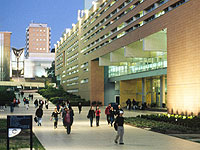 |
|
 |
| |
| |
| |
| |
| |
| |
| |
Campus: Kensington Campus
| |
| |
Career: Postgraduate
| |
| |
Units of Credit: 6
| |
| |
| |
| |
Contact Hours per Week: 0
| |
| |
| |
| |
| |
 |
|
 |
Description
This course aims to provide an understanding of the medical problems and treatments that need to be understood in developing new therapeutic agents and optimizing their use. Emphasis will be on highlighting the strengths and weaknesses of present therapies and identification of current research aimed at developing new therapeutic agents. The course begins with a review of drug safety including mechanism of adverse drug reactions and drug interactions, together with the influence of age, race and disease states on the tendency to develop adverse responses to medication. The course provides and integrated description of relevant physiology, pathophysiology, disease states: (a) infectious disease: bacterial, fungal, viral and parasitic infections: (b) immunological disorders: immunodefiency, hypersensitivity, transplantation: (c) haemotology: anaemias, haemorrhagic disorders, disorders of white blood cells, leukaemias, lymphomas; (d) cardiovascular disorders: cardiac arrhythmia, ischaemic heart disease, heart failure, hypertension, vascular disorders; (e) respiratory tract disorders: upper respiratory tract disorders, asthma, chronic obstructive pulmonary disease, acute bronchitis, bronchiectasis, cystic fibrosis, pneumonia; (f) renal tract disorders: renal failure, disorders of renal tubule function, obstructive uropathies, myoneurogenic disorders, incontinence, neoplasms: (g) ) gastrointestinal disorders: oesophageal disorders, gastritis, peptic ulcer, diarrhoea and constipation, gastroenteritis, malabsorption syndromes, chronic inflammation of the bowel, gastrointestinal neoplasms; (h) hepatic and biliary disorders: jaundice, ascites, fibrosis, cirrhosis, hepatitis, neoplasms.
Note: The course is elective for programmes 5504, and 9060.
|

